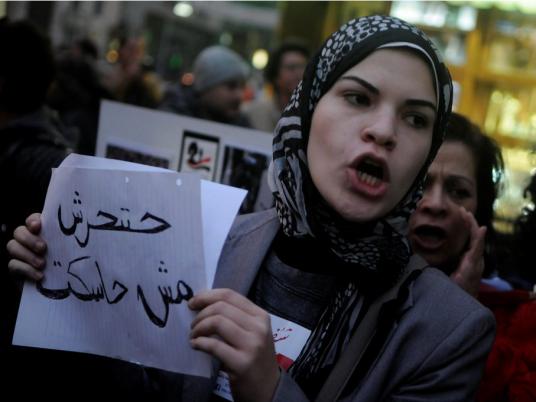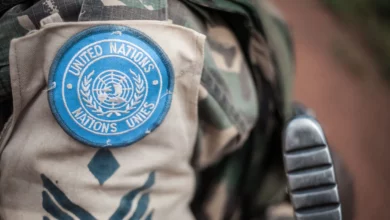
On 25 January, the date of the revolution’s second anniversary, more than 20 cases of sexual assault or rape took place in and around Tahrir Square.
One video circulated on YouTube by the organization Tahrir Bodyguard appeared to show one of the violent acts. In the footage, a crowd of young men surrounded a young woman. At the back, other men tried to move them away, with the assaulters acting like animals around their prey. Among the rescuers were Tahrir Bodyguard members.
Committed citizens
Soraya Bahgat started Tahrir Bodyguard after being horrified by the stories she heard about sexual violence in Cairo. She decided to start a Twitter account and called for volunteers to try to stop harassment in Tahrir.
“It started very quickly. After a couple of hours, she had 600 followers,” says Zeinab Sabet, a member and co-founder of the group.
Tahrir Bodyguard is one of several groups engaging with the problem of sexual violence in the absence of a strong police presence following the revolution.
The group doesn’t only include women. It has a mixed team of 10 permanent members, as well as other volunteers who join the group during protests. Members have their own jobs, in addition to working for the organization.
When a mass protest is organized in Tahrir, the group deploys volunteers in the square. “Generally, we are divided in two groups. We try to keep an eye on women who are particularly vulnerable, like women on their own,” Sabet says.
If a person is assaulted, volunteers act in two steps. A rescue team targets the person and tries to get her away from the attackers, then tries to keep the area and victim safe while she is taken away.
“It might get even more violent when the [woman] is taken out of the crowd. Men can pursue her or start to attack us. That’s why we wear helmets and jackets,” says Tarek Noraja, Tahrir Bodyguard member and rescuer.
“Next, an intervention team will take care of her, first giving psychological support and then taking her to the hospital or her home,” he says.
Male volunteers help take the woman or girl out of the crowd, while female volunteers take care of her once she is in a safer area. Sabet says this is important because the person attacked will likely feel more safe with women.
“We focus only on the victim, we don’t fight the harassers,” she says.
Recruiting volunteers
On 23 February, Tahrir Bodyguard attended a United Nations open volunteer day organized at the Shebab Club in Zamalek to recruit more volunteers. Noraja says this was not difficult, because the organization has started to gain popularity.
To join, potential volunteers must fill out an application form. The organization makes a copy of the applicant’s ID to check for criminal records. “Once the person is signed up, we organize a meeting for the new volunteers and explain how we work,” he says.
Like Sabet, Noraja joined Tahrir Bodyguard from its inception. “I joined because I was aware of what was happening in Tahrir Square, and I realized I didn’t want my sister, my mother or, one day, my wife to be in that position,” he explains.
Because it’s a long-term project, the group — which is self-funded with limited resources — needs more volunteers.
“At the moment, we can’t arrest anybody. We focus only on rescuing women,” says Sabet. “But if we grow in numbers, we will be able to create another team on the ground that would be responsible for the harassers.”
Ongoing and future projects
As well as protecting women, Tahrir Bodyguard’s aim is to empower women on the streets. Two weeks ago, the group launched a self-defense training campaign for women. Sabet acknowledges this won’t stop rape or sexual assault, but says it will hopefully empower women and decrease attackers’ success.
Tahrir Bodyguard is cooperating with Samia Allouba Gym, Dance & Fitness Center in Maadi for the weekly sessions.
Its next project aims to reach another level. “We are working to register as an NGO in order to be able to start the real work of awareness campaigns, especially for the younger crowd,” says Sabet. “We believe this should be handled at a root-cause level, which starts with education.”
It also hopes to work in places other than Tahrir Square. For now, Tahrir Bodyguard works in cooperation with other movements and NGOs that deal with issues related to sexual harassment or violence, such as HarassMap, Nazra for Feminist Studies and Banat Misr.
Sabet says Nazra helps provide psychological expertise after an assault. “It’s a collective effort,” she says.
The group also collaborates with political parties to provide volunteers during demonstrations. “We are a nonpolitical organization. The help from parties is limited to combating sexual [violence] during protests,” says Sabet. “We are looking to expand this cooperation to lobbying for efficient lawmaking against sexual harassment once a parliament is formed.”
This piece was originally published in Egypt Independent's weekly print edition.




